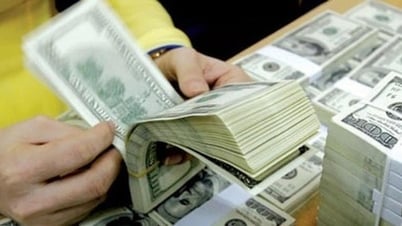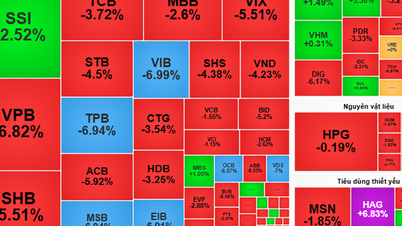The State Bank of Vietnam (SBV) has just issued Circular No. 23/2025/TT-NHNN amending and supplementing a number of articles of Circular No. 30/2019/TT-NHNN of the Governor of SBV regulating the implementation of compulsory reserves of credit institutions and foreign bank branches.
Accordingly, credit institutions implement a mandatory reserve of 3% for demand deposits and deposits under 12 months; 1% for deposits over 12 months.
However, from October 1, banks receiving compulsory transfers will have their required reserve ratios reduced by 50%. Thus, Vietcombank (VCB), MBBank (MBB), VPBank (VPB), HDBank (HDB) will receive preferential treatment in terms of required reserve ratios thanks to receiving compulsory transfers of weak banks.
These banks have quite high demand deposits (CASA), some banks have up to 550 trillion VND. With the current required reserve ratio of 3%, equivalent to 16,500 billion VND. If reduced by 50%, banks will have an additional 8,250 billion VND to lend.
Deposits over 12 months at Vietcombank amount to more than 1.2 million billion. With the current required reserve ratio of 1%, the bank must reserve 12,000 billion VND. If reduced by 50%, VCB will have an additional 6,000 billion VND.
The stock market increased strongly. Photo: Tung Doan
All four banks mentioned above have CASA and large capital mobilization. Therefore, the banks will have a few billion USD more to increase lending, pumping into the economy .
The stock market has recently grown strongly thanks to expectations of high economic growth, good business results of enterprises/banks, low deposit/loan interest rates, high credit growth, expectations of market upgrade...
Securities companies have also increased lending activities. It is estimated that the total outstanding securities loans of the 40 largest companies by the end of the second quarter reached about VND285 trillion. If the entire system is included, outstanding margin loans and advances could exceed VND300 trillion, equivalent to about USD11.4 billion - a record high.
Having more capital for lending by commercial banks not only supports the real economy but also creates a spillover effect to the stock market.
Mr. Luu Chi Khang, Director of the Research Center of CSI Securities Company, commented that the reduction in the required reserve ratio is information that has a very positive impact on the market. The first to benefit is the securities group, followed by the construction and real estate stocks.
Regarding the stock market in general, Mr. Khang believes that in the long term, the market will continue to rise. CSI Securities expects the VN-Index to reach 1,720 points for this wave.
However, in the short term, it is difficult to make a forecast. The reason is that the VN-Index has increased very strongly in the past time, so it is very likely that the market will record some unexpected correction due to profit-taking pressure.
Mr. Khang recommends that at the 1,620-1,625 point mark, investors should not chase the buying trend, but instead reduce the proportion.
Recently, many organizations have continued to make positive forecasts. Maybank Investment Bank has just raised its forecast for the growth of profits for the entire stock market in 2025 to 18.5%. This organization also gave a positive scenario, in which the VN-Index could reach 1,800 points.
In the second quarter, according to Maybank, the stock market performed well with profits increasing 34% year-on-year, thanks to strong growth in most sectors, notably maritime logistics. Domestically, sectors benefiting from infrastructure investment such as steel and real estate were boosted by the government's infrastructure promotion policy.
At the opening of the trading session on August 14, the stock market continued to increase. At 9:33, the VN-Index increased by 10.65 points to 1,622.25 points. Liquidity on HoSE reached nearly 8 trillion VND. MBBank (MBB) shares increased by 1,800 VND to 27,600 VND/share. Vietcombank (VCB) increased by 1,100 VND to 63,600 VND/share.
Vietnamnet.vn
Source: https://vietnamnet.vn/ngan-hang-nha-nuoc-ra-quy-dinh-moi-dong-tien-ty-usd-day-vn-index-len-dinh-cao-2431851.html




![[Photo] Images of the State-level preliminary rehearsal of the military parade at Ba Dinh Square](https://vphoto.vietnam.vn/thumb/1200x675/vietnam/resource/IMAGE/2025/8/27/807e4479c81f408ca16b916ba381b667)



![[Photo] Parade blocks pass through Hang Khay-Trang Tien during the preliminary rehearsal](https://vphoto.vietnam.vn/thumb/1200x675/vietnam/resource/IMAGE/2025/8/27/456962fff72d40269327ac1d01426969)




























































































Comment (0)